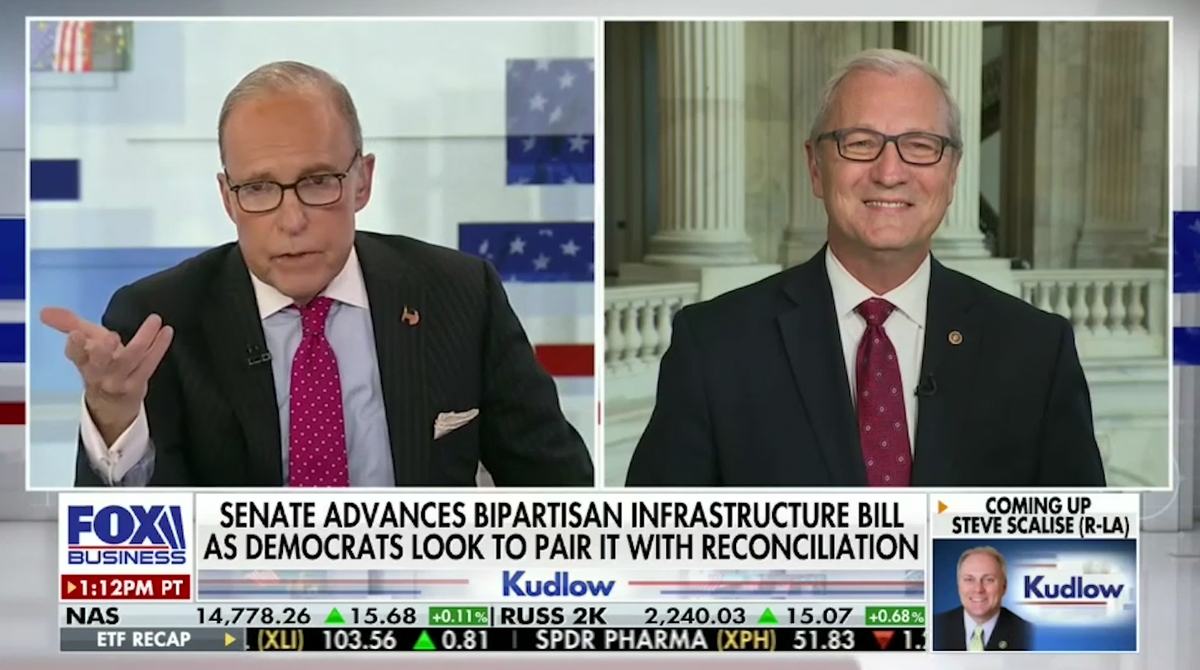Source: United States Senator Kevin Cramer (R-ND)
WASHINGTON – U.S. Senator Kevin Cramer (R-ND), a Senate Budget Committee member and the Ranking Member of the Senate Environment and Public Works (EPW) Subcommittee on Transportation and Infrastructure, participated in two television interviews this afternoon where he discussed the latest on the bipartisan infrastructure package being considered in the Senate and Democrats’ spending package. The first interview was with Larry Kudlow on Fox Business. Excerpts and a video link to the full interview are below.
On the Bipartisan Infrastructure Package:
“I hand it to the negotiators, building on what was already done in the committees. They pretty much stuck to hard infrastructure. By the way, in this inflationary time, infrastructure invests in the supply side of the economy which pushes back on inflation. [It’s] really important to have those assets that last for decades that have as primary purpose the profitability of our economy.”
“There was an attempt by the left to put language in there that would provide regulatory authority – far-reaching, certainly, utility type regulatory authority, even rate making authority. [Senator] Susan Collins went head-to-head until midnight the other night … to get just about all of that out. That was a major victory.”
On Democrats’ Spending Package:
“Taking the low-hanging fruit – that is to say, this infrastructure package, which is going to be wildly, I think, popular among the parties – taking that out of the big package, I think, makes it more difficult politically for the left to get everything that they want because moderate Democrats are getting what they want in this [bipartisan] bill. They don’t have to swallow the poison pill that Nancy Pelosi is going to try to feed them.”
Senator Cramer also joined Spicer & Co. on Newsmax to discuss infrastructure with Lyndsay Keith and Seth Denson. Excerpts and a video link to the full interview are below.
On Voting to Proceed:
“I’ve seen enough to know that the things that I care the most about are protected. Things like permitting reform, codifying the Trump rule on One Federal Decision, which was a really big. That was a really big deal. In fact, when President Trump issued that order, the first thing on the very first day that Joe Biden became President, he repealed that order. We were to get it in, for highway infrastructure, into this bill. That’s a really big deal. Maintaining the funding formula for rural America, making sure that states get the grants, pet projects get the grants. Things like that, that are really foundational, were preserved. And so I was comfortable enough to vote for cloture to proceed to the measure. So that’s several steps before even offering up amendments and voting for final passage. But I felt like we should get on this bill, start describing and explaining it, and let more of our colleagues see it now.”
On Infrastructure Investment:
“It invests in the supply side of the economy, which pushes against inflation. There are a lot of things to like about infrastructure, and we’ve certainly learned how important infrastructure [is]. You can’t have a growing economy without a solid infrastructure, not just roads and bridges, waterways, but also broadband, pipelines. transmission lines, airports, and rail.”
“In the 50-50 Senate, I think we’ve done about as well as we can do. And I think, you know, there’s, on balance, much more good in it [than bad].”
On Democrats’ Spending Package:
“I think by taking the things that are largely popular among both Republicans and Democrats in this country, and certainly infrastructure is one of those things – does Joe Biden get a little victory out it? Sure he does, but this one doesn’t require a loser – By taking that out, we make their [spending] package much less attractive. Moderate Democrats are going to have a much harder time voting for humans infrastructure package or a social welfare package when it’s absent, you know the low hanging fruit of an infrastructure package, which has as its primary purpose the profitability of our economy.”
“I actually think that strategically, politically speaking, this makes it more difficult for them to pass the big package. And if we hadn’t done that, if we end up not passing this, they’re going to lump this plus more into the $3.5 trillion, and they’re going to pay for it with massive tax increases, and you’re going to see all of the permitting reforms taken out.”
On Identity Politics, Criticism of Negotiators:
“Politically speaking, it’s a gift that keeps on giving. Because this is not where America is. This is not where the vast majority of America is, where everything has to be divided by color of skin or other, you know, other divisions. Identity politics is counterproductive. Maybe it works in certain congressional districts, but I don’t think it works very well on a large scale, and frankly think it’s why Democrats are probably bracing themselves for a really tough 2022.”
